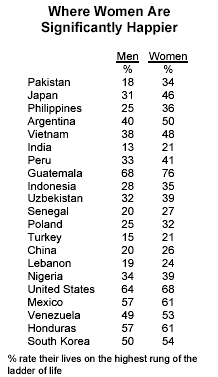
All around the world, from rich countries in North America to the poorest nations in Africa and Asia, men and women tend to differ from one another when it comes to their outlook on life, their family, their future and the world at large.
Women are somewhat happier than men with their lives overall, according to 38,000 interviews in 44 countries conducted by the Pew Research Center for the Pew Global Attitudes Survey. And, compared with five years ago, the women surveyed reported more often than men that they had made progress in their lives.
The global gender gap is not limited to happiness, for it also reflects differing life perspectives. Women show greater concern about issues that directly affect the family and home life. Men express more concern about issues outside the home and more optimism about the future. Men are happier with their family life and more optimistic about what lies ahead for their children.
Rating One’s Life
All over the world, men and women in the same country had roughly the same response to a question asking them where they stand in achieving their lives’ goals. The happiest people (both men and women) live in Canada and the United States among the countries Pew surveyed. The people least satisfied with their lives live in Eastern Europe and parts of Africa.

However, the Pew survey also detected that women give their lives a better rating in 29 of 44 countries surveyed. In some countries the differences between genders is very small and in others it is quite significant. Women’s greater satisfaction with life is pervasive in many of the less-developed regions of the world: in 7 of the 8 countries surveyed in Asia, 6 of the 8 nations in Latin America and all 5 nations in east and southern Africa. In particular, women are much happier than men in Japan, India, the Philippines, Pakistan and Argentina. In contrast, men and women in Western Europe and Canada are quite similar in the way they judge their lives.
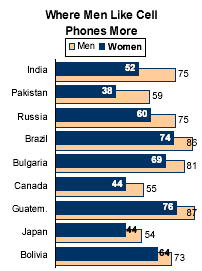
Women in most countries also tend to be more satisfied than men with the personal progress they have made in recent years. In three-fifths of the countries surveyed (26 of 44) more women than men feel they are better off now than they were five years ago. Moreover, in 10 of those nations–including the United States (52%) and Nigeria (69%)-more than half the women surveyed say their lives have improved.
For better or worse, men and women within the same regions assess their life’s progress similarly. In West Africa both sexes say they have made the most personal progress (65% of men and 69% of women say they are better off). In sharp contrast, both men and women in the Conflict Area–from Uzbekistan to Egypt- agree they have lost ground. In those nations only 55% of men and 40% of women say they have lost ground.
When asked about the electronic gadgets that have come to symbolize progress in the modern world, men and women overwhelmingly agree that recent technological developments have been a change for the better. But “boys” are much fonder of their new high-tech “toys.”
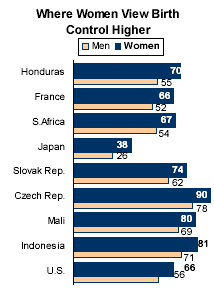
In 37 of 44 countries, more men than women give cell phones a thumbs up. And, although strong majorities of women in most countries also think mobile phones have made life better, there are vocal dissenters. Two-in-five Japanese women and one-in-three British and Canadian women say cell phones have made life worse.
Men and women similarly like to surf the web. The only notable opposition to the internet is in Jordan, where more than half the women (54%) think it is a change for the worse, and in the United States, where a quarter (25%) of women criticize it. As with cell phone use, some of the strongest support for these new technologies, especially among men, is in Africa, where there is the least access to both the internet and cell phones.
Another technological achievement, birth control, is widely popular among both men and women. But in two-thirds of the countries surveyed (29 of 44) women are more likely to think that the ability to control reproduction is a change for the better. Men and women are most at odds over the pill and other such devices in Latin America. In Guatemala and Honduras, for example, two-in-three women support family planning, while one-in-four men oppose it.
Women More Focused on Home, But Less Happy with Family Life
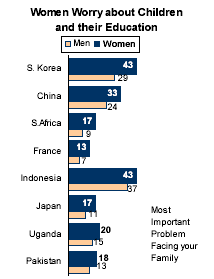
When asked to reflect on specific aspects of their lives, women are inwardly focused, showing more concern about issues that affect them and their families. Men are more concerned with problems outside the home. For example, men in more countries mentioned the actions of the government and work-related difficulties when asked an open-ended question about the most important problem facing their family. Women in more countries volunteer health problems and difficulties with children and education. As might be expected, economic hardships are the most frequently cited concerns by both sexes.
Despite, or possibly because of their outward focus, men rate their family life better than women. In 26 of 44 societies, men surveyed say they are very satisfied with life at home. The greatest disagreement between men and women over family life is in Eastern Europe, notably Ukraine and the Czech Republic, where men are much happier than women about their home life. Overall, women are less happy with their family life in each of the six Eastern European nations included in the survey. But when assessing household income, women say they are more satisfied than men in 25 of 44 nations. The poll finds women in poorer nations happier with their incomes than men, while in richer counties there is less of a gender difference in opinions about one’s income.
Gender Gap on View of Country
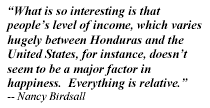
Most people are dissatisfied with the way things are going in their country, and in half the nations surveyed women are the most dissatisfied. The greatest disagreements between the sexes are in France, where 39% of men but only 26% of women are satisfied with national conditions, and in the United States, where 47% of men are satisfied but only 36% of women agree.
In the industrial world, the people who are gloomiest about the national state of affairs are women over age 50 in both North America (65%) and Western Europe (74%). Those who are most upbeat are middle-aged men, ages 30-49, in North America (50%) and younger men, ages 18-29, in Western Europe (40%).
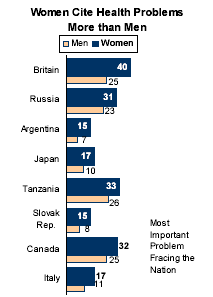
Younger men and women in these regions share fairly similar perspectives on the state of their nation up to about age 30. But in middle and old age, their views diverge sharply, as women’s satisfaction with the state of their nation declines.
When asked an open-ended question about what are the most important problems their nation faces, economics and politics are most often cited. But with regard to other issues, respondents loosely reflected gender-specific concerns. In a majority of societies, women mention troubles with children and education, health and the environment more often than men. Men single out political issues more than women do.
Regarding specific national problems, women are more likely to be worried about concerns closer to home. For example, in two-thirds of the countries surveyed (29 of 44), women are more likely than men to say moral decline is a very big problem. And in 31 of 44 nations studied, women are more likely than men to think that AIDS and other diseases are a very important national issue. At the same time, in a majority of countries (25), men are more likely than women to say corrupt political leaders are a major challenge for the country.
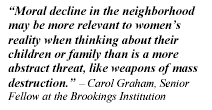
Women in 30 of 44 nations flag crime as a very big national problem. This is particularly the case in North America, where 56% of women say it is a very big problem but only 38% of men agree.
Men and women are equally worried about immigration, but women are much more concerned about emigration. In 29 of 44 countries women are more troubled than men about people leaving the country, possibly because women are the most likely to be left at home caring for the children, the parents and family farm or business while their husbands, sons and brothers go in search of work. This gender difference is particularly acute in countries such as Mexico, Pakistan and Bangladesh that have sent significant numbers of men to the industrial world.
Men More Concerned with WMD
Both men and women are dissatisfied with the state of the world. The only major disagreements between the sexes are in India, where men are much more unhappy about global affairs than women are, and in France and the United States, where women are more dissatisfied. As with their concerns about the state of the nation, the unhappiest people in North America and Western Europe are both men and women over the age of 50.
Women around the world say AIDS and other infectious diseases are the greatest threats to the world. In 40 of 44 nations women outnumber men identifying disease as a problem. But in two-thirds of the countries, men are more likely to mention religious and ethnic hatred as a global threat. And by the same margin, men are more likely to identify the problems posed by the spread of nuclear weapons.
The Future
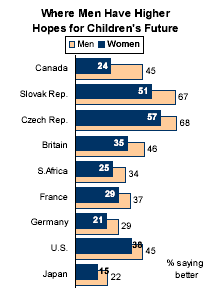
In more than half (24 of 44) the countries surveyed men are more optimistic about their personal futures than are women. This includes the United States, where 62% of men and 59% of women have a favorable view of what lies ahead. Both sexes are particularly upbeat about the future in West Africa, where 86% of men and 87% of women are optimistic. The most pessimistic are men and women in Eastern and Southern Africa, where one-in-five (19%) of those surveyed have a negative view of the future.
One factor in men’s optimism is their rosy view of what lies ahead for their children. In 27 of 44 countries men are more likely than women to think that the next generation will have a better life. The men in West Africa are the most confident about this. The least confident about the next generation’s prospects are Guatemalan men (75% think children will be worse off) Japanese women (71%) and German women (68%). Strikingly, more than half the men in Western Europe, Eastern and Southern Africa and the Conflict Area plus more than half the women in North America, Western Europe and Eastern and Southern Africa think the future will be worse for children. The greatest disparity in views about children’s future is in Canada, where 45% of men but only 24% of women think children will have it better.
These results are drawn from polls conducted by the Pew Global Attitudes Project, a series of worldwide public opinion surveys. The project has issued two major reports, “What the World Thinks in 2002” – based upon 38,000 interviews in 44 nations – and “Views of a Changing World, June 2003” – based on 16,000 interviews in 20 nations and the Palestinian Authority. Surveys were conducted by local organizations under the direction of Princeton Survey Research Associates. Full details about the surveys, and the project more generally, are available at www.pewresearch.org/pewresearch-org/politics




